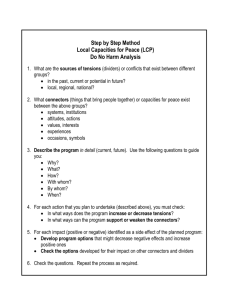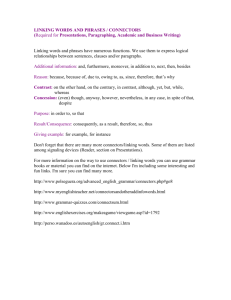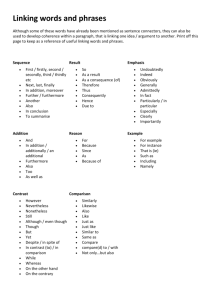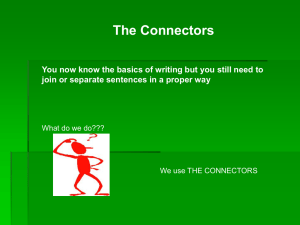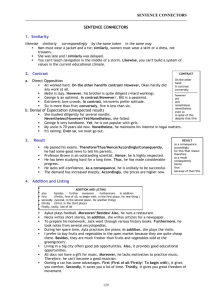delAware – Summer 2010 – Transition
advertisement
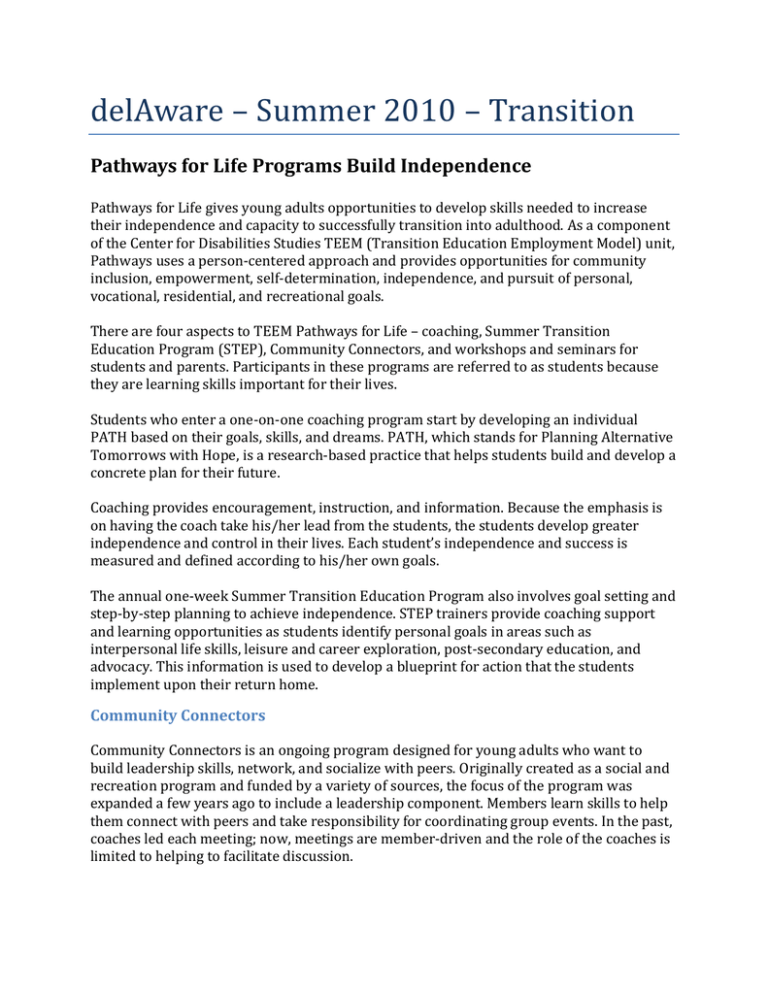
delAware – Summer 2010 – Transition Pathways for Life Programs Build Independence Pathways for Life gives young adults opportunities to develop skills needed to increase their independence and capacity to successfully transition into adulthood. As a component of the Center for Disabilities Studies TEEM (Transition Education Employment Model) unit, Pathways uses a person-centered approach and provides opportunities for community inclusion, empowerment, self-determination, independence, and pursuit of personal, vocational, residential, and recreational goals. There are four aspects to TEEM Pathways for Life – coaching, Summer Transition Education Program (STEP), Community Connectors, and workshops and seminars for students and parents. Participants in these programs are referred to as students because they are learning skills important for their lives. Students who enter a one-on-one coaching program start by developing an individual PATH based on their goals, skills, and dreams. PATH, which stands for Planning Alternative Tomorrows with Hope, is a research-based practice that helps students build and develop a concrete plan for their future. Coaching provides encouragement, instruction, and information. Because the emphasis is on having the coach take his/her lead from the students, the students develop greater independence and control in their lives. Each student’s independence and success is measured and defined according to his/her own goals. The annual one-week Summer Transition Education Program also involves goal setting and step-by-step planning to achieve independence. STEP trainers provide coaching support and learning opportunities as students identify personal goals in areas such as interpersonal life skills, leisure and career exploration, post-secondary education, and advocacy. This information is used to develop a blueprint for action that the students implement upon their return home. Community Connectors Community Connectors is an ongoing program designed for young adults who want to build leadership skills, network, and socialize with peers. Originally created as a social and recreation program and funded by a variety of sources, the focus of the program was expanded a few years ago to include a leadership component. Members learn skills to help them connect with peers and take responsibility for coordinating group events. In the past, coaches led each meeting; now, meetings are member-driven and the role of the coaches is limited to helping to facilitate discussion. When funding sources for Community Connectors ended in the summer of 2009, the group’s future was uncertain. After several months, members and their families spoke up about their desire to continue the program – and they began discussing how to sustain Connectors. At “Save the Connectors” meetings, members and their families brainstormed ideas for seeking outside funding sources and raising their own funds. Their ultimate goal is to secure long-term, diverse, and stable funding. The first decision was to charge modest membership dues to help support the group. Then fundraising efforts began in earnest. Bob Spengler, a member of the Knights of Columbus (KofC) Coffee Run Council and father of Connectors member Robert Spengler, applied for a KofC grant. In February, the Connectors were awarded $560 from funds the Council earmarks to support persons with intellectual disabilities. In March, Connectors raised more than $500 through a fundraiser at Friendly’s on South College Avenue in Newark that was coordinated by members. After making presentations to Greek organizations on the University of Delaware (UD) Newark campus, Connectors, their parents, and staff members gained support from the Greeks. Sigma Pi Fraternity and Sigma Kappa Sorority members joined the Connectors for a car wash in April that raised $725. Additional UD partnerships are being explored, working toward the future goal of integration into the campus community and more opportunities for socialization with campus peers. Debbie Bain, program coordinator for Pathways for Life and a coach/facilitator for Connectors, notes that the funding difficulties have provided a great opportunity for growth for many of the Connectors. Some have become more active in the group, helping to plan and organize meetings, lead meetings, and plan events. “You see that they’ve made a commitment because this is important to them, something they benefit from,” says Debbie, adding, “They’re very impassioned about this group.” For more information about Pathways for Life and Community Connectors, contact Debbie Bain at dbain@udel.edu or 302.831.8733.

